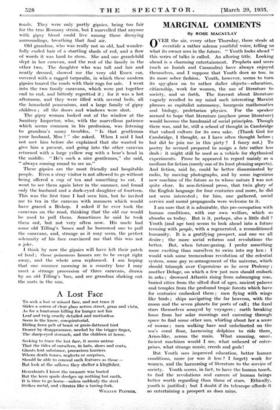MARGINAL COMMENTS
By ROSE MACAULAY
OVER the air, every other Thursday, there steals at eventide a rather solemn youthful voice, telling us what its owner sees in the future. " Youth looks ahead " this series of talks is called. An alluring title. Looking ahead is a charming entertainment. Prophets and seers (such as Isaiah and Cassandra) have always enjoyed themselves, and I suppose that Youth does so too, in its more sober fashion. Youth, however, seems to turn its spy-glass on to rather duller objects—education, citizenship, work for women, the use of literature to society, and so forth. The forecast about literature vaguely recalled to my mind such interesting Marxist phrases as capitalist astronomy, bourgeois mathematics and biology, proletarian physics. For the speaker seemed to hope that literature (anyhow prose literature) would become the handmaid of social principles. Though there was, said he, still a school of thought in Cambridge that valued culture for its own sake. (Thank God for Cambridge, I thought, as I have often thought before ; but did he join me in this piety ? I fancy not.) To poetry he seemed prepared to assign a fate rather less drab : it might still be used as a vehicle for rhythmical experiments. Prose he appeared to regard mainly as a medium for fiction (surely one of its least pleasing aspects). And fiction, said he, could be better disseminated by radio, by moving photographs, and by some ingenious new machine of the future as to whose nature I was not quite clear. In non-fictional prose, that twin glory of the English language for four centuries and more, he did not seem interested ; • for him, one gathered, social service and moral propaganda were welcome to it.
I am sure that it is admirable, this pre-occupation with human conditions, with our own welfare, which g0 absorbs us today. But is it, perhaps, also a little dull ? Youth (and age too) seems to look ahead into a future teeming with people, with a regenerated, a reconditioned humanity. It is a gratifying prospect, and one we all desire ; the more social reforms and revolutions the better. But, when future-gazing, I prefer something more exciting than ourselves to swim into my ken : I would wish some tremendous revolution of the celestial system, some gay re-arrangement of the universe, which should triumph over Copernicus as he over Ptolemy ; another Deluge, on which a few just men should embark in arks ; drowned Atlantis rising from submerging Seas, buried cities from the silted dust of ages, ancient'palaces and temples from the profound tropic forests which have for centuries embosked them ; men flying with wings like birds ; ships navigating the far heavens, with the moon and the seven planets for ports of call ; the fixed stars themselves assayed by voyagers ; earth breaking loose from her solar moorings and careering through space to find some other sun, whirling about her a score of moons ; men walking bare and unhelmeted on the sea's coral floor, harnessing dolphins to ride them, Arlon-like, across the main. What amazing, omni- facient machines would I see, what unheard of enter- prises, what strange music, creeds and gods !
But Youth sees improved education, better human conditions, more (or was it less ? I forget) work for women, and the harnessing of literature to the service of society. Youth seems, in fact, to have the human touch, to find the revolutions and careers of human beings better worth regarding than those of stars. Ethically, youth is justified ; but I doubt if its telescope affords it so entertaining a prospect as does mine.






































 Previous page
Previous page